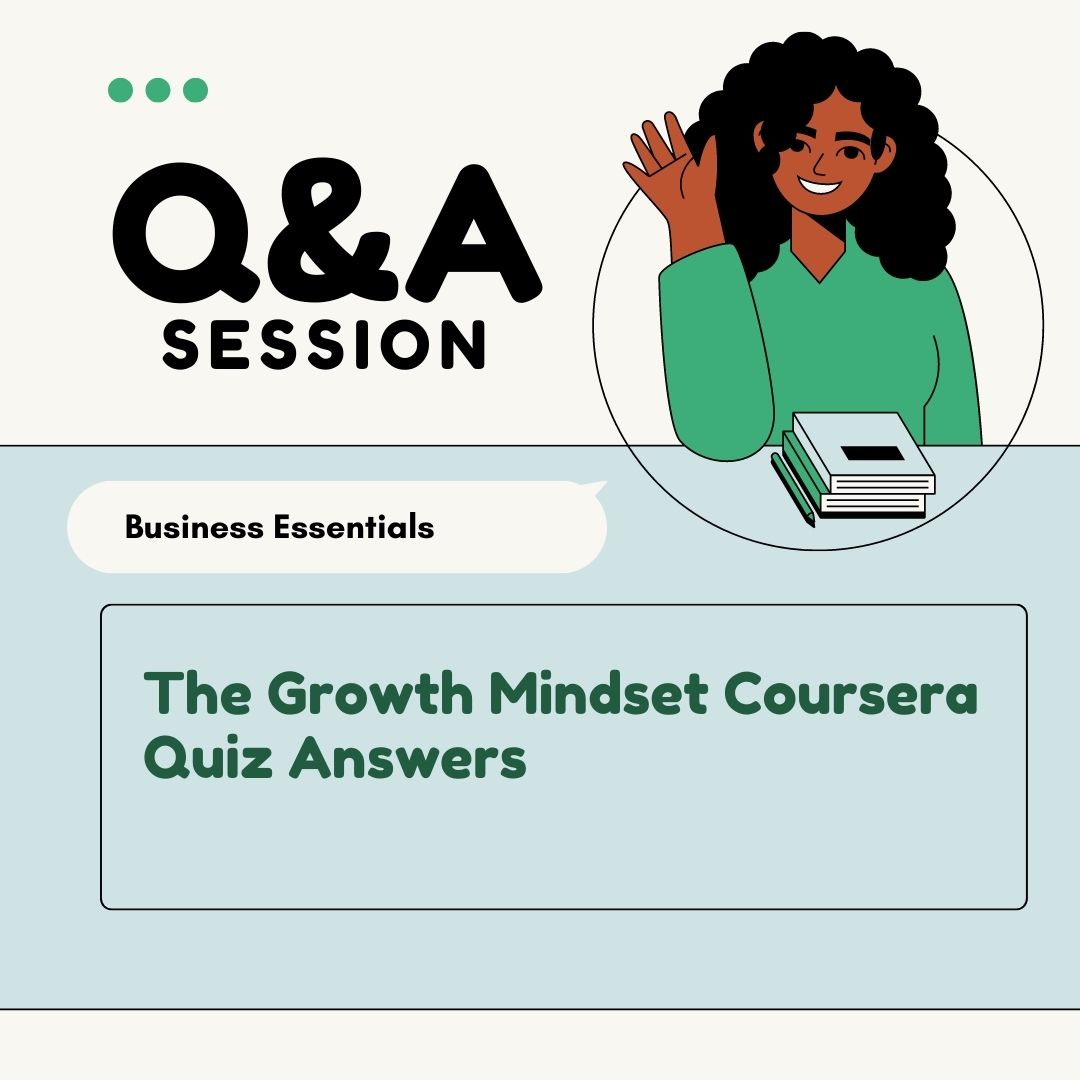Table of Contents
Get All Weeks The Growth Mindset Coursera Quiz Answers
Quiz 1: Fixed vs. Growth Mindset Statements
Q2. Your intelligence is a fixed state and you can’t change it very much.
Q3. No matter how much intelligence you have, you can always change it quite a bit.
ViewQ4. You can learn new things, but you can’t really change how intelligent you are.
ViewQ5. You can always substantially change how intelligent you are.
ViewQ6. I like work best when I can do well without putting a lot of effort in.
ViewQ7. I like work best when it makes me think hard.
ViewQ8. I like doing work that I can do perfectly well almost all the time.
ViewQ9. I like doing things that I’ll learn from even if I make mistakes.
ViewQ10. When I have to put in extra work, it makes me feel like I’m not as good as my peers/colleagues.
ViewQ11. When something is hard, it makes me want to spend more time on it, not less.
ViewQuiz 2: Characteristics of Growth Mindset People
Q1. A person with a Growth Mindset often gets stuck thinking their way is the right way.
ViewQ2. A person with a Growth Mindset will often see failure as a setback, albeit a temporary one that can be overcome.
ViewQ3. A person with a Growth Mindset is more apt to follow the decisions of others in a group setting.
ViewQ4. A person with a Growth Mindset may not like change but adapts to it well.
ViewQ5. A person with a Growth Mindset is apt to seek out new opportunities.
ViewQ6. A person with a Growth Mindset resists trying different strategies.
ViewQuiz 3: Skillset Stretch and Mindset Reframe
Q1: What are the two ways to bridge the gap between who you are now and who you want to become?
View2. Skillset Stretch or Deliberate Practice
Q2. What is one example or version of a Skillset Stretch?
ViewQ3. What is one example or version of a Mindset Reframe?
ViewQuiz 4: Mindset Spectrum
Q1. Name at least 3 different arenas or areas where you exhibit a mindset.
- Academics
- Career
- Personal Relationships
Q2. Your mindset can shift from moment to moment, setting to setting, arena to arena, and person to person.
ViewQ3. You cannot have a Fixed Mindset about one skill or ability, and a Growth Mindset about another one.
ViewQ4. You can view another person’s ability or skills with a Fixed Mindset but have a Growth Mindset about your own abilities and skills.
ViewQ5. Changing your setting can affect your mindset.
ViewQ6. You react with the same mindset regardless of who you are interacting with.
View
Quiz 1: Myths About Growth Mindset
Q1. A growth Mindset places an emphasis on being nice to others and open-minded in beliefs
ViewQ2. Growth Mindset helps you believe that you can do anything or be anyone.
ViewQ3. A growth Mindset doesn’t expand your capacity to get things done.
ViewQ4. To foster a Growth Mindset in others, you should only praise effort.
ViewQ5. In a business, you can measure Growth Mindset by examining financial wellness and an increase in profitability.
ViewQ6. A growth Mindset does not equal a positive attitude.
ViewQuiz 2: Reframe Exercise
Q1. I can’t handle that promotion because I don’t know what I will do if I fail.
Select the best version of a Rephrase Statement from the following options.
ViewQ2. I can’t be my real self at work or I’ll be judged.
Select the best version of a Rephrase Statement from the following options.
ViewQ3. I can’t ask for that new project because I may get rejected.
Select the best version of a Rephrase Statement from the following options.
ViewQ4. I have to put in a lot of hours to be successful.
Select the best version of a Rephrase Statement from the following options.
ViewQ5. I’m not smart enough to contribute at meetings.
Select the best version of a Rephrase Statement from the following options.
ViewQuiz 3: Comparison Syndrome Mindset Manifestations
Q1. A person with a Fixed Mindset is always trying to show how smart and talented they are.
ViewQ2. A person with a Fixed Mindset is very tolerant of mistakes for themselves and others.
ViewQ3. A person with a Growth Mindset is good at looking at others and using them as inspiration to improve.
ViewQ4. A person with a Growth Mindset notices the gap between who they are now and who they want to become and gets motivated by other people’s success.
ViewQ5. A person with a Fixed Mindset doesn’t let other people’s success discourage them from moving forward.
ViewQ6. A person with a Fixed Mindset sees other people as judges, not allies.
ViewQuiz 1: Organizational Mindset Definitions
Q1. An organization that sees employees as possessing potential, encourages them to develop, and acknowledges and rewards them for improvement is said to have a Fixed or Growth Organizational Mindset.
ViewQ2. What’s another term for a Fixed Organizational Mindset?
ViewQuiz 2: Fostering a Growth Mindset
Q1. For the following statement, answer True if it fosters a Growth Mindset in an organization, and False if it does not.
The supervisor of a department provides her team with opportunities such as training, workshops and coaching.
ViewQ2. For the following statement, answer True if it fosters a Growth Mindset in an organization, and False if it does not.
A supervisor shares stories about how he failed at something.
ViewQ3. For the following statement, answer True if it fosters a Growth Mindset in an organization, and False if it does not.
The department you work for values genius and talent above all else.
ViewQ4. For the following statement, answer True if it fosters a Growth Mindset in an organization, and False if it does not.
Your manager makes it a point of giving you assignments that are just beyond your current competency level and calls them “stretch assignments.”
ViewQ5. For the following statement, answer True if it fosters a Growth Mindset in an organization, and False if it does not.
Your supervisor doesn’t discuss your mistakes when giving feedback, only praising what you did right.
ViewQ6. For the following statement, answer True if it fosters a Growth Mindset in an organization, and False if it does not.
Your supervisor ignores your mistakes or reprimands you about them.
ViewQ7. For the following statement, answer True if it fosters a Growth Mindset in an organization, and False if it does not.
Your supervisor delegates tasks to the team to help employees further skills.
ViewQuiz 3: Fixed vs. Growth Mindset Managers
Q1. Label the following statement about the behavior of managers either Fixed Mindset or Growth Mindset.
A manager hires a new employee because she possesses the exact skill set needed for the job and believes that talent is all she will ever possess in her position.
ViewQ2. Label the following statement about the behavior of managers either Fixed Mindset or Growth Mindset.
A manager doesn’t believe in coaching employees. They either have what it takes to succeed in their position or they don’t.
ViewQ3. Label the following statement about the behavior of managers either Fixed Mindset or Growth Mindset.
A manager believes her new employee has the potential to improve and looks forward to seeing her flourish and possibly get promoted.
ViewQ4. Label the following statement about the behavior of managers either Fixed Mindset or Growth Mindset.
A manager seeks feedback from her employees in order to do better in her supervisory position.
ViewQuiz 4: Best Practices of Growth Mindset
Q1. Three (3) of the following statements demonstrate key behaviors of Growth Mindset Leaders. Which ones are they?
View2. A leader tells stories to his team about his past failures and how he learned from them.
3. A leader gives praise to his team members when they achieve the desired outcomes of the division they work for.
Q2. Match the statement to the type of Positivity Quotient.
I keep the vision of the finished project or assignment in my head, seeing it completed on time and in a successful manner.
ViewQ3. Which of the following ways help to combat groupthink? (Select all that apply).
View2.If team members are nervous about change, pay attention to that and allow them to voice concerns.
3.Ask for anonymous input from employees as part of the process of making decisions for the entire team.
Quiz 5: Navigating Change
Q1. A Growth Mindset means that everything can be changed.
ViewQ2. Change can sometimes lead to something better than the current status
ViewQ3. Growth Mindset people focus on what they hope to gain by a change, instead of what they may lose.
ViewQ4. A Fixed Mindset doesn’t stand in the way of change.
ViewQ5. Meeting new challenges and mastering some or all of them helps you gain confidence.
ViewQuiz 1: How Your Mindset Shows Up
Q1. One of your coworkers blames other team members when he fails at something instead of asking for help to repair the mistake.
ViewQ2. A coworker keeps thinking over her problems and setbacks, tormenting herself with the notion that they mean she is incompetent.
ViewQ3. One of your coworkers jumps at the chance to tackle a project even if it means he may not entirely succeed.
ViewQ4. One of your coworkers is concerned with being judged, which is ironic as she often judges others on the team.
ViewQ5. Your coworker looks for team members worse off than her whenever she makes a mistake.
ViewQ6. Effort is only for people starting with a deficiency in their skill set, intelligence, or talent.
ViewQ7. One of your coworkers always asks for feedback on her performance, takes notes, asks questions, and seems genuinely interested in learning how to improve.
ViewQuiz 2: Redemptive Story Reframing
Q1. “I was so disappointed when I didn’t get selected for that special project, but I spoke to my supervisor and she explained what I can do to be better prepared to take on a project of that nature in the future.”
ViewQ2. “Losing that account was such a big setback for the department and I know everyone is really upset with me about it. I ignore them all now at team meetings and don’t ask for tips on how to get the account back or nail a new one like it in the future.”
ViewQ3. “The new software I developed didn’t get selected by the IT team to be rolled out this quarter. I asked some team members to serve as beta testers, letting me know ways the software can be improved and streamlined and plan to try to launch it again the next quarter.”
ViewQ4. “I messed up the most recent assignment my supervisor gave me and know that the team doesn’t trust me now and my job will never be the same again.”
ViewQuiz 3: Feedback Statements
Q1. In this quiz, I’ve given you a number of feedback statements. Label each one as Fixed or Growth. And then grab a few to use as examples when giving or receiving feedback at work.
Ready to get started?
ViewQ2. You could have planned better by taking into consideration how to mitigate risks.
ViewQ3. You’ve been too aggressive in your approach with customers.
ViewQ4. You can handle mutliple responsibilities if you prioritize and delegate the workload.
ViewQ5. You haven’t met your targets this month.
ViewQ6. You need to be more patient while dealing with customers.
ViewQ7. You’re unable to handle multiple responsibilities.
ViewQ8. Your plans were way off course.
ViewQ9. You need to make sure you achieve your targets by focusing on one deal at a time.
ViewQ10. You need to significantly improve your skills before taking on a managerial position.
ViewQ11. You will never become a manager if you keep this up.
ViewQuiz 4: Situations and Triggers
Q1. In the list below, select each scenario that best represents when it is difficult to practice a Growth Mindset.
View2. When your job is focused on numerical outcomes and metrics.
3. When your team is under a considerable amount of stress.
4.When the organization is in the middle of a crisis.
5.When your team is having problems with a new launch.
6.When you first start a job.
Q2. Select any of the statements below that are common triggers for the Fixed Mindset.
View2.When you’ve failed in a big way.
Conclusion:
In conclusion, the growth mindset stands as a powerful philosophy that has the potential to transform individuals and societies. By fostering a belief in the malleability of skills and intelligence, people can unlock their true potential, overcome challenges, and achieve remarkable personal and professional growth
More Related Quiz Answers >>
Critical Thinking Skills for the Professional Coursera Quiz Answers
Teach English Now! Second Language Listening, Speaking, and Pronunciation Quiz Answers
Teach English Now! Second Language Reading, Writing, and Grammar Quiz Answers




